Tachyon tidbits featuring Patricia A. McKillip, Lavie Tidhar, Kage Baker, and John Kessel
The latest reviews and mentions of Tachyon titles and authors from around the web.

Patricia A, McKillip (Photo: Stephen Gold/Wikimedia Commons), Lavie Tidhar (Kevin Nixon. © Future Publishing 2013), Kage Baker, and John Kessel (Andy Duncan)
MEREADER praises Patricia A. McKillip’s World Fantasy Award-winning novel THE FORGOTTEN BEASTS OF ELD.
This short fantasy novel enchanted me thoroughly with its gorgeous formal language, imagery, scenery, and magical animals. The female protagonist, Sybel, cares for mythical creatures alone on a mountain, until she is given a baby prince to care for. When he grows up, she is thrown into the middle of the rivalry between the king and a competing court. She tries to keep herself out of the drama, until she is brought in against her will. It’s so cool and rare to find a strong woman character who knows who she is, who has power without the need to prove anything by wielding it. Watching Sybel almost lose that quality in a search for revenge was tragic; seeing her finally save herself and prevent a war, with the help of her loved ones, was triumphant. Except for the villain, who mostly acted in fear and desire, the characters all treated each other with such love and acceptance and forgiveness. The final twist was perfect and beautiful. If you like immersive fantasy and pretty sentences, this book is worth a try.
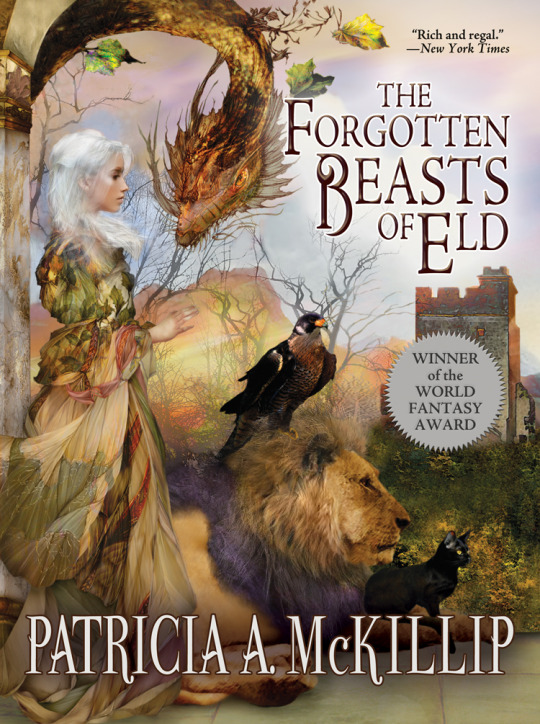
Marty Halpern on his MORE RED INK discusses Lavie Tidhar’s CENTRAL STATION.
And today I’m pleased to announce that CENTRAL STATION has won the John W. Campbell Memorial Award for best science fiction novel of the year.[1] The award was presented during the Campbell Conference, on June 16-18, at the University of Kansas in Lawrence. The Campbell Conference is an annual weekend event focusing on “discussions about the writing, illustration, publishing, teaching, and criticism of science fiction.”
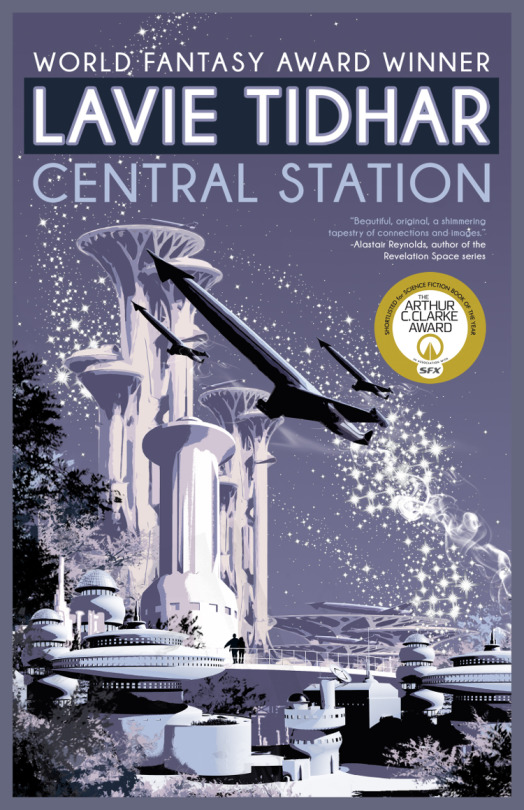
I worked on CENTRAL STATION back in 2015, and wrote about it in my November 30 blog post. And in my book received post on May 6, 2016, I included some thoughts from the author himself when he announced the sale of CENTRAL STATION to Tachyon Publications. Between these three blog posts of mine, you can read commentary from the author Lavie Tidhar, excerpts from the book itself, and starred reviews from both Publishers Weekly and Library Journal.
WE BE READING enjoys Kage Baker’s THE HOTEL UNDER THE SAND.
I am in the middle of Kage Baker’s fantastic Company series but was also curious about what else she had written. I found this one that sounded interesting and then stuck it on the old TBR shelf to get dusty. Well, at the end of the latest Readathon, I started getting burned out at the end of the night and the books on my stack didn’t seem like the right reads for the moment so I browsed my TBR and the 180 small pages of this one seemed perfect.
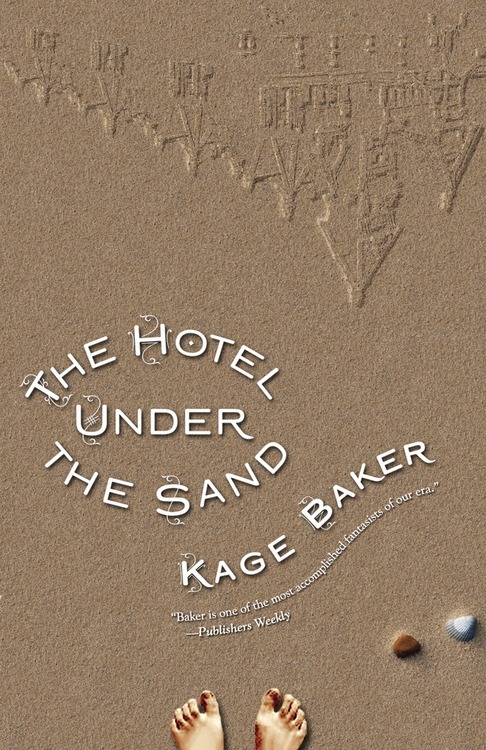
So, did it live up to DWJ’s excessive praise? Short answer, yes. It was possibly one of the sweetest, funnest, most original chapter books I’ve ever read. There’s one of the best ghosts I’ve ever read about, the coolest magical setting, and a super awesome treasure hunt. I mean, it starts with a girl washing up on an island and she immediately finds herself water and food and makes her own shelter! She’s not helpless! It also made my heart so happy with its friendships and found family. I have no idea why this book hasn’t found its audience yet but I’m going to work on changing that.
John Kessel is interviewed in the June 2017 issue of LOCUS.
John Joseph Vincent Kessel was born September 24, 1950 in Buffalo NY. He received a dual BA in English and Physics from the University of Rochester in 1972, an MA in English from the University of Kansas in 1974, and a PhD in English from the University of Kansas in 1981. From 1979-82 he was a copy and news editor at Commodity News Service in Kansas. In 1982 he began teaching at North Carolina State University as professor of creative writing and American literature.
Kessel’s first story appeared in 1978, but he gained prominence with Nebula Award-winning novella ‘‘Another Orphan’’ (1982). Other notable stories include Sturgeon Memorial Award winner ‘‘Buffalo’’ (1991), Tiptree Award winner ‘‘Stories for Men’’ (2002), and Shirley Jackson and Nebula Award winner ‘‘Pride and Prometheus’’ (2008). Some of his stories were collected in Meeting in Infinity (1992), The Pure Product (1997), and The Baum Plan for Financial Independence (2008).
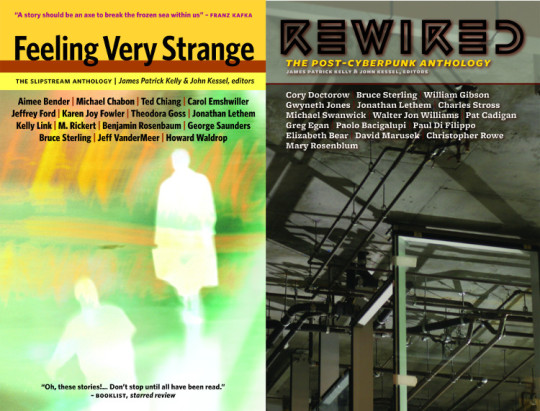
He edited Sycamore Hill workshop anthology Intersections (1996, with Richard Butner & Mark L. Van Name), and co-edited several books with James Patrick Kelly: Feeling Very Strange (2006), Rewired (2007), The Secret History of Science Fiction (2009), Kafkaesque (2011), Nebula Awards Showcase 2012 (2012), and Digital Rapture (2012).
Debut novel Freedom Beach (1985) was co-authored with James Patrick Kelly. First solo novel Good News from Outer Space (1989) was a Campbell and Nebula Award finalist, and screwball comedy time-travel novel Corrupting Doctor Nice appeared in 1997. His latest novel The Moon and the Other (2017) further explores the world introduced in ‘‘Stories for Men’’. A novel version of Pride and Prometheus is forthcoming. Kessel lives in Raleigh NC with his wife, author Therese Anne Fowler.
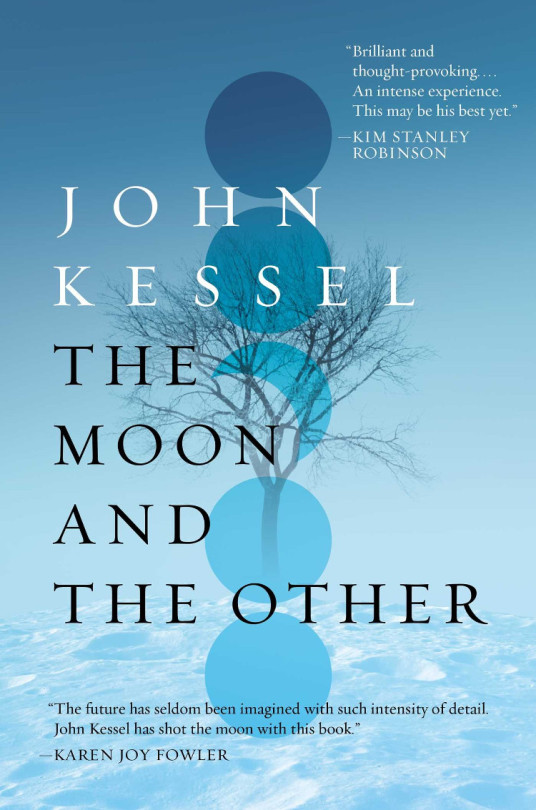
‘‘For a full-time academic, teaching a full course load, the academic year lends itself more easily to writing short fiction. I wrote short stories, and I enjoyed the hell out of writing short fiction. I didn’t see it as an inferior form or as a warm-up for writing novels. But the world of publishing wants novels more than it wants short stories, and I wanted to write novels, too. In the summer I would work on a novel, and the semester would start and I would have a month or so where I would keep writing. Then the hammer would come down, and I would have so much work to do at school that I would get less writing done. It took me a long time to finish novels. My first novel, Good News from Outer Space, took me about four years to write from front to end. That doesn’t seem like so long now, but it was slow. My next one, Corrupting Dr. Nice, again took me a number of years to write. I started thinking about The Moon and the Other, a novel set in this made-up Society of Cousins lunar world, in around 1999. I wrote four proof-of-concept stories, set in the background, exploring the society and how it worked and what the different issues would be, including a novella, ‘Stories for Men’ which came out in 2002.”
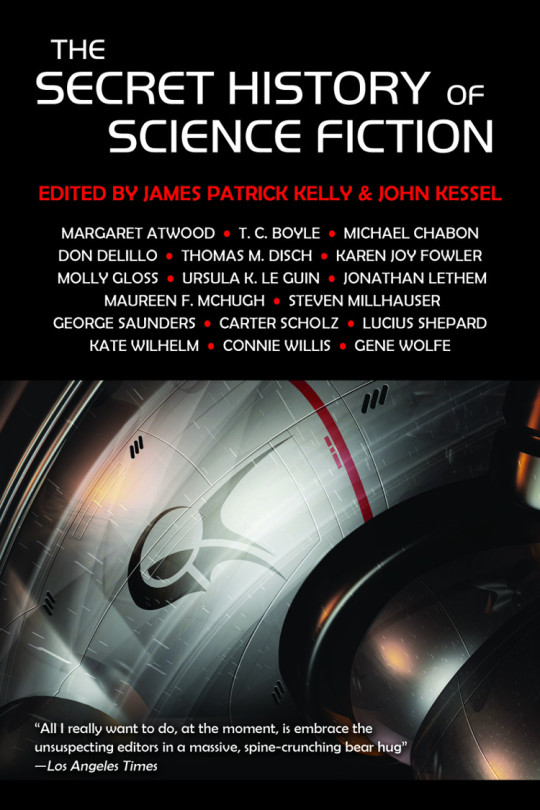
“One of the things The Moon and the Other does is explore masculinity, or what it is to be male (if there is such a thing as male). A lot of different people are reimagining that right now. What makes a person male? We have this bathroom law in North Carolina, causing endless trouble, about who gets to be in the men’s bathroom, and who gets to be in the women’s bathroom, and how you decide that. In The Moon and the Other, I wanted to present a lot of different ideas of what it is to be a man. Some of them are historical, some are notions we have today. Others are affected by the fact that it’s in the future in my invented Society of Cousins.
‘‘I think, at least historically in the United States, our ideas of masculinity have been impoverished. Where I grew up in a working-class family in Buffalo NY, the men I knew in my family, and my school, and in my life, had given to them a number of different visions – by the culture at large, by their families, by the economic system – that I believe were self-destructive. That’s still the case. The feminist movement has been tremendously helpful to men, if they’re willing to look at it and engage with it, because the potential lies there to free men from having to be what they have been. Someone said that throughout human history the vast majority of men have been a pair of hands and a strong back, and that’s it. That’s been the degree to which society and the economic system and the culture have valued them. The privileged men at the top – the ones that we write about in fantasy novels – can be other things. They can be kings, noblemen, rulers, captains of industry. The men I grew up with – my father, my uncles, my cousins – were workers. That was their value. They were at the bottom of a chain of people kicking down. It wasn’t women who were oppressing them, although I think that many men felt that way. The only people they had the right to kick were their wives and children. I don’t want to totalize that vision, but it seems to me that’s been a lot of what our culture in the West (and elsewhere) has been. I think that’s sad and destructive.”
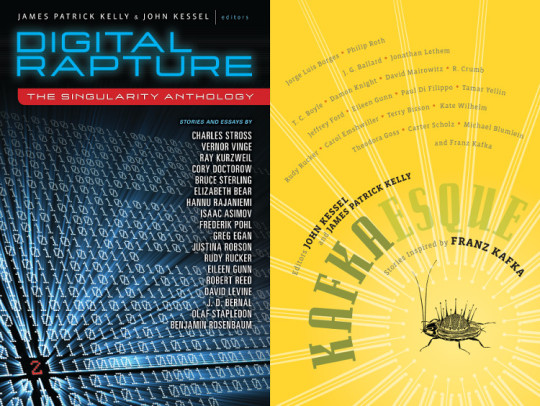
For more info about THE FORGOTTEN BEASTS OF ELD, visit the Tachyon page.
Cover by Thomas Canty
For more info about CENTRAL STATION, visit the Tachyon page.
Cover by Sarah Anne Langton
For more info about THE HOTEL UNDER THE SAND, visit the Tachyon page.
Cover by Ann Monn
For more info about FEELING VERY STRANGE: THE SLIPSTREAM ANTHOLOGY, visit the Tachyon page
Cover by John Berry
For more info about REWIRED: THE POST-CYBERPUNK ANTHOLOGY, visit the Tachyon page.
Cover by Patty Nason
For more info about THE SECRET HISTORY OF SCIENCE FICTION, visit the Tachyon page.
Cover by Ann Monn
For more info about KAFKAESQUE: STORIES INSPIRED BY FRANZ KAFKA, visit the Tachyon page
Cover by Josh Beatman
For more info about DIGITAL RAPTURE: THE SINGULARITY ANTHOLOGY, visit the Tachyon page
Cover by Josh Beatman
